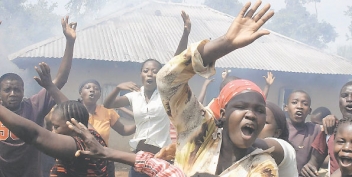 In the lead up to World Elder Abuse Awareness Day next week, we are speaking out and condemning in the strongest terms possible the accusations and killings of older men and women based on allegations of witchcraft.
In the lead up to World Elder Abuse Awareness Day next week, we are speaking out and condemning in the strongest terms possible the accusations and killings of older men and women based on allegations of witchcraft.
Accusations target the vulnerable
Belief in witchcraft is strong in most African countries and a range of factors can lead to accusations, but recent studies have shown that the accusations are often made maliciously and specifically target poor and vulnerable older people.
These issues have been raised recently in the media, which is good as it brings them to the public’s attention. For example, The Daily Nation’s article “When death knocks on the door and takes all” profiles shocking and brutal killings which are taking place in Nyanza province.
We are demanding that the government through its police force look into these killings immediately. Older people’s rights must be upheld and defended. They must be protected from discrimination and abuse based on their age.
“Gross violation of human rights”
Mrs. Terry Obath, chairperson of HelpAge Kenya said: “Killings and abuse of older women and men as a result of witchcraft accusations is a gross violation of human rights. We are calling on the law enforcement agencies to ensure that killings related to witchcraft are treated as murder and are investigated, prosecuted and punished accordingly by the police and judiciary.”
In Kenya it was reported in the media that an average of six people were lynched every month in 2009 in Kisii district alone for allegedly practising witchcraft. We estimate that 42 older people were killed in three districts in 2008 and 23 older people in three provinces in the first half of 2009.
The assessment linked witchcraft accusations to crop failure, poor milk production by cows, school drop outs, polygamy, loss of wealth and alcoholism in families. Poverty, disease, ageism and gender inequality are underlying causes for these accusations and violent attacks.
Older people are subjected to horrible violence
Older women and men are subjected to beatings and, in the worst cases, burnt alive by what are being described in the media as “angry lynch mobs” taking the law into their own hands.
As our Rights Coordinator, Dolline Busolo put it: “There is so much more to be done to ensure older women’s and men’s rights are better protected. It is our individual and collective responsibility.”
Read more about our work on older people’s rights
